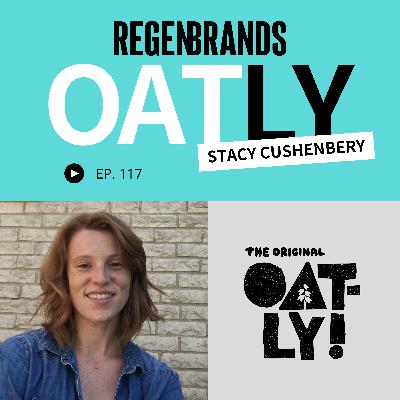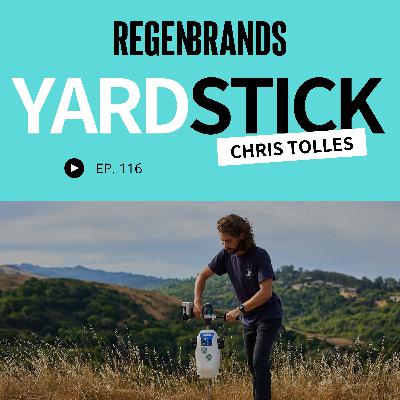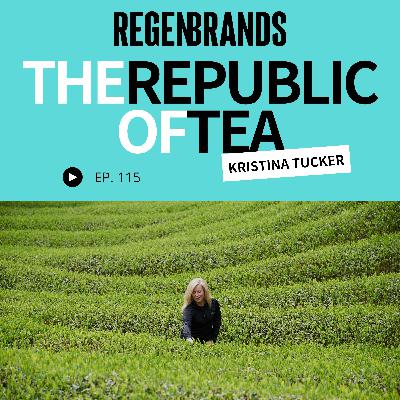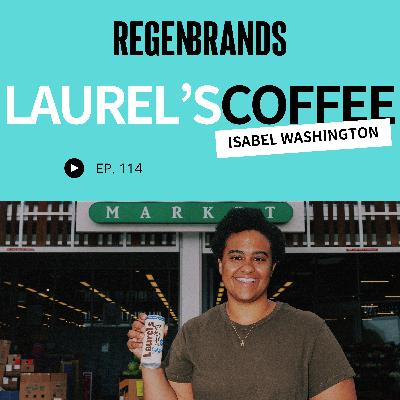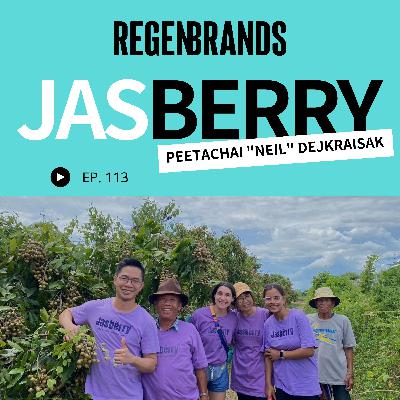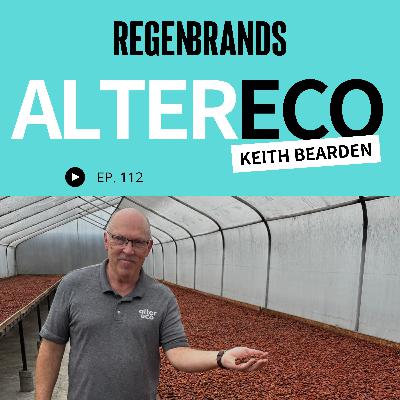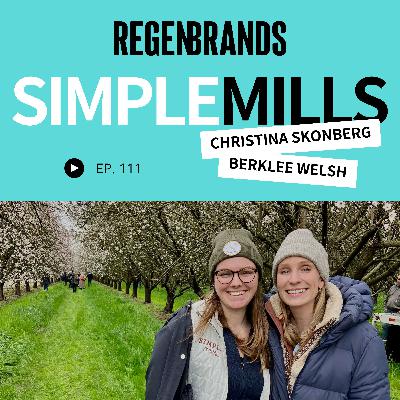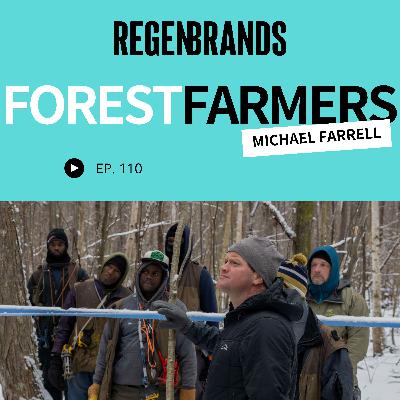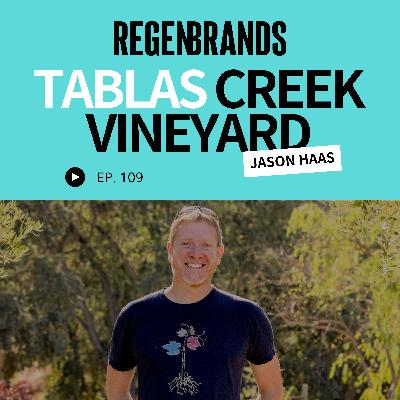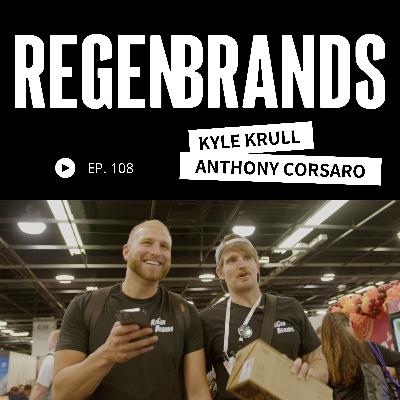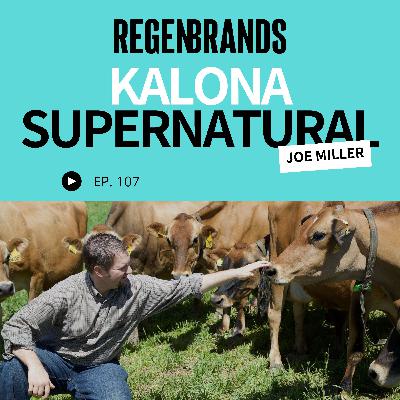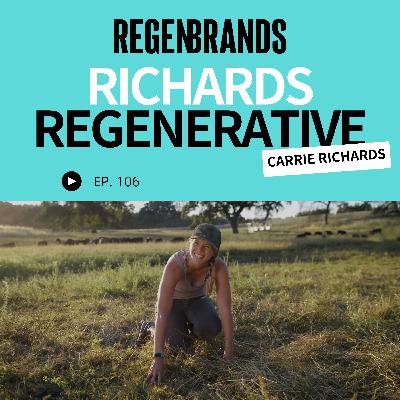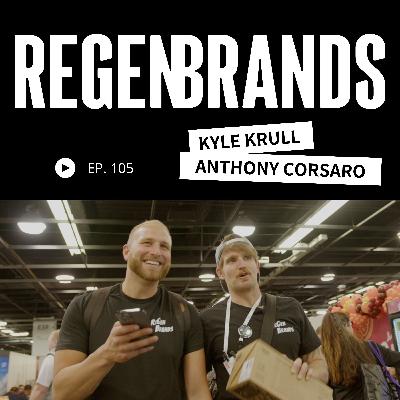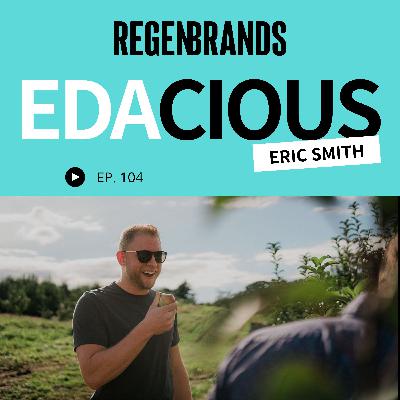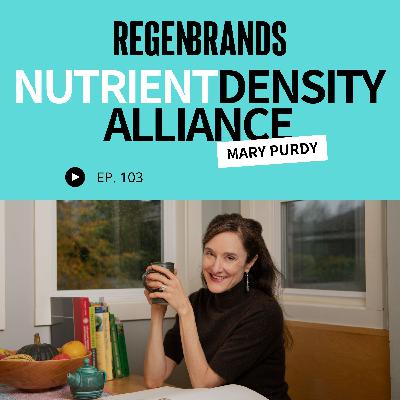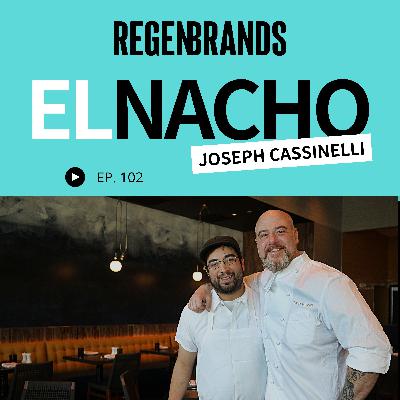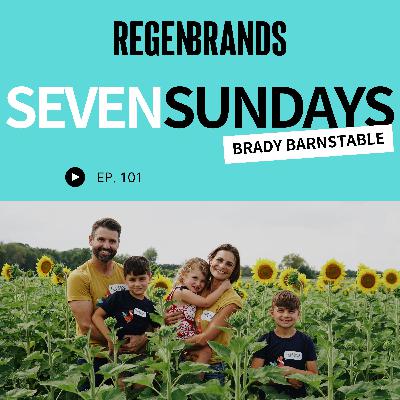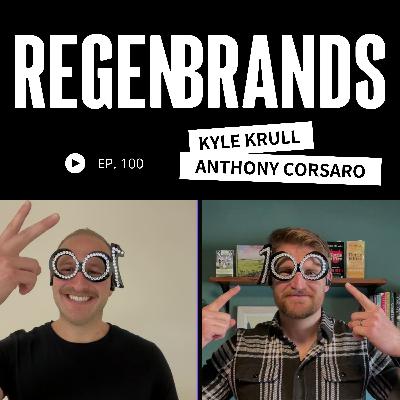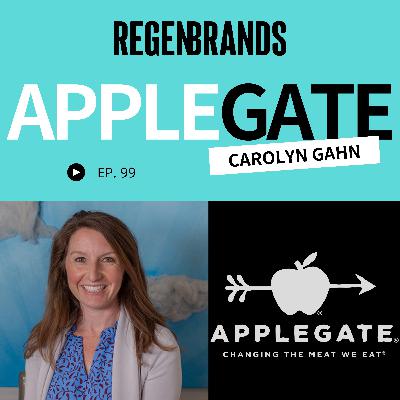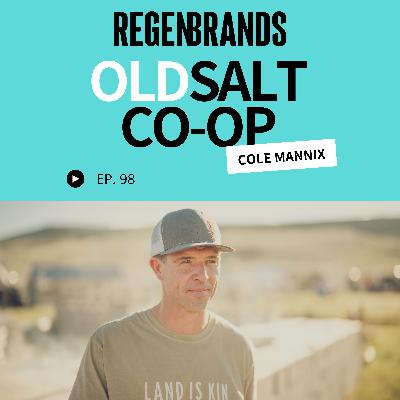Discover ReGen Brands Podcast
ReGen Brands Podcast

ReGen Brands Podcast
Author: Regen Brands Podcast
Subscribed: 13Played: 300Subscribe
Share
© ReGen Brands Podcast
Description
The ReGen Brands Podcast is a place for consumers, operators, and investors to learn about consumer brands supporting regenerative agriculture and how they’re changing the world. The ReGen Brands podcast is brought to you by the Regen Coalition & Outlaw Ventures and is hosted by Kyle Krull & Anthony Corsaro.
118 Episodes
Reverse
On this episode, we sit down with Stacy Cushenbery, Senior Manager for Global Regenerative Agriculture at Oatly, to unpack how one of the world’s most recognizable plant-based brands is tackling regeneration at scale.
We explore why Oatly chose an “equivalent acres” approach instead of chasing identity-preserved sourcing, and how that decision balances procurement flexibility with landscape-level impact. We dive into why mill partners are the hidden backbone of their program — organizing farmers, shaping agronomy plans, and making regen real on the ground.
Stacy shares the nuts and bolts of what practices Oatly is paying farmers to adopt, how much support they receive, and what the company has learned about building trust and iteration into the process. And finally, we go inside the business model — how Oatly calculated program costs down to a cost-per-liter of oat milk and embedded those expenses directly into procurement budgets.
It’s a conversation about pragmatism meeting ambition, about turning lofty sustainability goals into operational reality, and about how brands can work across systems to create genuine impact.
Episode Highlights:
🌍 Working towards system-level change in their regional supply sheds
🌾 Incentivizing regen practices in their two main sourcing regions
💡 Choosing mass balance impact over a segregated sourcing approach
🤝 Partnering with mills as the backbone of farmer engagement
🧑🌾 Supporting farmers with flexible, farmer-choice practice menus
🌱 Incentivizing farmers with per-acre payments for practice adoption
📈 Mapping sustainability costs down to cost per liter of oat milk
🛠 Embedding regen incentive costs into the procurement budget
📺 Educating consumers through authentic farmer storytelling
🎯 Calling for recognition of the true cost of food to drive change
Links:
Oatly
Regrow
Grain Millers
If you find this content valuable, please consider donating to support our work
Follow ReGen Brands on LinkedIn
Subscribe to the ReGen Brands Weekly newsletter
On this episode, we're digging deep into why measuring soil carbon is so essential but so difficult, and what it takes to make it faster, cheaper, and easier.
We’re joined by Chris Tolles, Co-Founder and CEO of Yard Stick, a soil carbon measurement company that's helping unlock the data needed to scale regenerative agriculture by affordably and accurately delivering the ground-truth data that proves the ROI of regenerative practices.
Chris walks us through the graph that convinced him soil carbon was the climate solution to bet on — and why most current measurement methods are too expensive, too slow, or too inaccessible to meet the moment. You'll learn how Yard Stick's field-based spectroscopy technology changes the game, and why ground-level measurement will always matter more than watching from space.
We also explore how Yard Stick is working with carbon project developers, land funds, and food brands — why these partners want the data, how they're using it, and what outcomes its helping them achieve.
Plus, Chris tells us what it actually looks like to measure soil carbon on a thousand-acre farm, he gets real about the limitations of consumer demand to spur a regenerative revolution, unpacks the driver behind the underfunding of nature-based climate solutions, and shares his perspective on what the voluntary carbon market might look like in 10 years.
Episode Highlights:
🌍 Improving soil carbon measurement to help reverse climate change
🧲 The one powerful graph that created his soil carbon conviction
💰 Why measuring soil carbon costs so much today
🧪 Replacing costly lab analysis with real-time soil spectroscopy
🤝 How they work with project developers, investors, and brands
💪 Reducing supply chain volatility with soil health insights
📉 Why nature-based solutions are still underfunded
💭 What will the voluntary carbon market look like in 10 years?
👀 Unpacking the bearish case for regenerative consumer demand
🌽 Embracing paradox and finding the “both and”
Links:
Yard Stick
Soil Carbon Capacity + Cost Graph Image
Soil Carbon Capacity + Cost Graph Study
Yard Stick Probe In Action Video
Yard Stick Efficacy Scientific Paper
Soil Health Institute’s ECONOMICS of Soil Health Systems on 30 U.S. Farms
NYC Climate Week Soil + Ag People Walk/Run
Voluntary Carbon Market (VCM)
Measurement, Reporting, Verification (MRV)
Rhode Island School of Design (RISD)
Soil Health Institute
Clear Frontier
SLM Partners
General Mills
Organic Valley
Regrow
Perennial
Maui Nui
Sol Simple
Carbon Removal Certification Framework (CRCF)
Carbon Border Adjustment Mechanism (CBAM)
Indigo Ag
Verra (Carbon Registry)
Quantis
Science Based Targets Initiative (SBTi)
Agriculture, Forestry, and Other Land Use (AFOLU)
If you find this content valuable, please consider donating to support our work
Follow ReGen Brands on LinkedIn
Subscribe to the ReGen Brands Weekly newsletter
On this episode, I’m joined by Kristina Tucker, the longtime Minister of Enlightenment at The Republic of Tea.
We explore the brand’s 30-year journey from launching the first certified Organic tea in 2003 to piloting new Regenerative Organic Certified® SKUs today. Kristina shares how the company sources over 400 teas and herbs from more than 80 growing regions, and what it takes to balance innovation, ingredient integrity, and supply chain complexity at scale.
We dive into how regenerative fits into their historical sourcing evolution — from organic to biodynamic to ROC™ — and why the brand is taking a thoughtful, "wait and learn" approach to rolling out regenerative products across their massive catalog.
You’ll also hear about the product, packaging, and business decisions that have contributed to their success and longevity in the tea category, their super unique fax-based origin story, and their commitment to supporting smallholder farmers across the globe.
So pour yourself something to sip on and get ready to learn about this Republic and its Ministers, Ambassadors, Citizens, and Embassies.
Episode Highlights:
🌿 Launching the first certified Organic tea in 2003
📦 Sourcing 400+ teas and herbs from over 80 growing regions
🌍 Why they have Ministers, Ambassadors, Citizens, and Embassies
🌱 Introducing 3 new Regenerative Organic Certified® SKUs
🧑🌾 Supporting smallholder, single-origin herb farmers across the globe
🌾 Navigating volume constraints to responsibly scale regen sourcing
🫖 Delivering 30+ servings per SKU in shelf-efficient steel tins
📊 Offering customizable assortments for retail partners
📈 Launching 10–20 new SKUs annually
👏 Supporting female farmer leadership in Sri Lanka
Links:
The Republic of Tea
Ministers, Ambassadors, Citizens, and Embassies
The Republic of Tea Book
Regenerative Organic Certified®
Ethical Tea Partnership (ETP)
Women of Tea Sri Lanka Program
If you find this content valuable, please consider donating to support our work
Follow ReGen Brands on LinkedIn
Subscribe to the ReGen Brands Weekly newsletter
On this episode, we’re talking with Isabel Washington, the founder of Laurel’s, a rapidly growing ready-to-drink coffee brand powered by regenerative A2 dairy.
We dive into Isabel’s personal journey discovering A2 milk, how it transformed her relationship with dairy, and why it became the cornerstone of her brand.
You’ll hear how she spotted a massive gap in the RTD coffee aisle — where 90% of products were non-dairy — and why she designed Laurel’s first three SKUs to reflect what people actually order at real coffee shops.
Isabel also pulls back the curtain on the scrappy, behind-the-scenes grind of building a CPG brand from scratch — from tying up all her money in the first production run to grinding through 40 demos in 50 days at Erewhon.
And we talk about the bigger picture — how content, culture, and motivated moms will determine the future of regenerative food and beverage.
Episode Highlights:
💡 Isabel’s A2 dairy awakening
🥛 Reclaiming dairy for Gen Z and Millennial women
🤔 Why RTD coffee had become 90% non-dairy
🧃 Moving from idea to shelf in just 8 months
🧋 Designing SKUs around what consumers actually drink
🏪 Driving early growth with 40 demos in 50 days at Erewhon
🌱 Prioritizing regen sourcing, even without marketing claims
💵 The complexity and cost of product certifications
📈 How social media content will determine regen awareness
🛍 Why motivated mothers are the most influential shoppers
Links:
Laurel’s Coffee
Alec’s Ice Cream
McKinsey & Company
Erewhon
Grüns
Alexander Family Farm
Painterland Sisters
Jimbo’s
If you find this content valuable, please consider donating to support our work
Follow ReGen Brands on LinkedIn
Subscribe to the ReGen Brands Weekly newsletter
On this episode, we’re diving into the incredible origin story of Jasberry with the company’s Co-Founder and CEO, Neil.
You’ll hear how a life-changing high school friendship, a Google search for the world’s best rice scientist, and two years living in rural Thailand all led to a new superfood rice brand that you can now find on shelves at every Whole Foods nationwide.
We unpack Jasberry’s mission to tackle generational farmer poverty, the science behind their superfood purple rice, and why organic and regenerative rice farming is actually lowering costs and producing higher yields for their farming partners.
Neil also shares how Jasberry works with 2,500 rice farmers in Thailand who earn 14x more than the national average, why they're focused on expanding into foodservice for their next phase of growth, and how they’re dealing with a new, brutal 19% tariff.
Episode Highlights:
🌾 Superfood rice with 40x more antioxidants than brown rice
🌱 Rooting the mission in farmer poverty and social justice
👨👩👧👦 Living with farm families for 2 years to earn trust and understanding
📉 Confronting a system where farmers were earning just $0.40 a day
🥇 Fueling the brand with breakthrough genetics from Thailand’s top rice scientist
🌍 Working with 2,500 farming families across Thailand
💥 Increasing farmer incomes by 14x above the national average
💸 Taking 7 years to scale and land national retail distribution
🍽️ Focusing on foodservice and direct-to-consumer for future growth
🚫 Wrestling with a new 19% tariff on Thai imports
Links:
Jasberry
Seub Nakhasathien
Northwestern Kellogg School of Management
Grameen Bank
Holy Basil
If you find this content valuable, please consider donating to support our work
Follow ReGen Brands on LinkedIn
Subscribe to the ReGen Brands Weekly newsletter
On this episode, we sit down with Keith Bearden, CEO of Alter Eco, to unpack one of the most turbulent years in chocolate’s history.
We dive into why cacao prices have more than tripled over the past two years and how a new 39% Swiss import tariff is disrupting their business in ways we have never seen before.
Keith shares how Alter Eco is helping farmers transition to dynamic agroforestry systems across Latin America, why regenerative certification doesn’t always pencil out, and what needs to happen to unify the movement so consumers truly understand regen’s value.
Episode Highlights:
🍫 Leading in eco-friendly chocolate for over 20 years
📈 Why cacao prices have skyrocketed the past two years
🌴 Helping cacao farmers transition to dynamic agroforestry systems
💵 Providing direct financial and agronomic support to farmers
🛒 Why Swiss manufacturing is now a core part of brand messaging
🚫 The 39% Swiss import tariff causing major disruption
🤷 Why regen certification doesn’t pencil out right now
🤤 Consumers buy for indulgence, then learn about impact
🗣 The imperative for more harmonized regen certification and communication
🤯 Why we’re headed towards $10 chocolate bars
Links:
Alter Eco
Alter Eco Sustainability Report
Cacao Tariffs & Prices Soar
Kiss the Ground
Regenerative Organic Certified®
Fair for Life
B Corp
Nextworld Evergreen
If you find this content valuable, please consider donating to support our work
Follow ReGen Brands on LinkedIn
Subscribe to the ReGen Brands Weekly newsletter
On this episode, we’re joined by Berklee Welsh and Christina Skonberg from Simple Mills — the number one cracker, cookie, and baking mix brand in the natural channel today.
We unpack how Simple Mills is focused on contribution over attribution, working with more than 4,000 farmers on 70,000 acres to build a regenerative supply that doesn’t necessarily translate into product-specific claims.
We talk about product innovation, how underutilized crops like buckwheat and red beans are making their way into cookies and crackers, and why designing for soil health starts with good product design.
You’ll hear how their ingredient-specific regen programs started with a few sunflower growers in the Midwest and have now expanded to almonds, cocoa, and coconut sugar — and how those programs are grounded in listening to farmers, not prescribing to them.
Berklee and Christina unpack how Simple Mills’ regenerative programs drive supply resilience, employee morale, product differentiation, and even ingredient quality — making the case for why Simple Mills invests in this work, even without on-pack claims.
This one is packed with quality insights from two top-notch sustainability pros.
Episode Highlights:
📢 Why regen at Simple Mills is about contribution > attribution
🌾 Agriculture makes up over half of Simple Mills’ carbon footprint
🚜 Farmers need brands to help de-risk regenerative transitions
💰 Paying regen bonuses to sunflower farmers in the Midwest
📦 Their regen programs now span 4 ingredients and 70,000+ acres
🔬 Designing regen into product innovation from day one
📲 Leveraging regen efforts in marketing and what is resonating with consumers
💸 The non-consumer-focused business case for regen investments
🤝 Why scaling regen = more meetings
🎯 How all flourishing is mutual
Links:
Simple Mills
Future Farmers of America (FFA)
General Mills
Ferrero Rocher
Starbucks
Annie’s
Cascadian Farm Organic
Regenerative Organic Certified®
The Almond Project
National Young Farmers Coalition (NYFC)
Robin Wall Kimmerer - “The Serviceberry”
If you find this content valuable, please consider donating to support our work
Follow ReGen Brands on LinkedIn
Subscribe to the ReGen Brands Weekly newsletter
On this episode, we’re going deep into the forest with Michael Farrell, Co-Founder of The Forest Farmers.
Michael and his team are managing over 10,000 acres of forest in New York and Vermont to produce what they believe to be the most regenerative sweetener on the planet.
You’ll hear how The Forest Farmers’ keep forests diverse and thriving, why maple syrup is nutritionally and environmentally superior to more popular, cheap sweeteners, and how brands can integrate maple ingredients into everything from beverages to baked goods.
We unpack how maple trees become a full suite of Regenerative Organic Certified® products — from sap to syrup to sugar — and how those ingredients are now powering a new generation of regenerative brands like Recoup, Wild Orchard, and Alec’s Ice Cream.
Michael also shares why only 1% of U.S. maple trees are tapped today, and how shifting consumer demand can change that.
Episode Highlights:
🍁 Making maple a leading regenerative organic ingredient
🍭 Maple sugar used to be the dominant sweetener in early American diets
🔍 Today’s mainstream syrups are often entirely artificial with no maple at all
🌳 Regeneratively managing over 10,000 acres of diverse forests
🛠️ Vacuum pumps, tubing grids, & gravity — how tree sap flows at scale
🇯🇲 The skilled Jamaican H2A team farming the forest
🎯 The nutritional and environmental advantage of maple-based ingredients
🧪 Process to taste — neutral sweetness or a bold maple profile for CPGs
💼 Supplying brands like Recoup, Wild Orchard, & Alec’s Ice Cream
🌲 The monster maple opportunity in both supply and demand
Links:
The Forest Farmers
Cornell Maple Research Center
Regenerative Organic Certified®
Wild Orchard Tea
Recoup Beverages
Alec’s Ice Cream
International Maple Syrup Institute
USDA Maple Syrup Guidelines
Burlap & Barrel Spices
IFT Show
If you find this content valuable, please consider donating to support our work
Follow ReGen Brands on LinkedIn
Subscribe to the ReGen Brands Weekly newsletter
On this episode of the ReGen Brands Podcast, we’re joined by Jason Haas – Partner and General Manager at Tablas Creek Vineyard. Tablas Creek is located in Paso Robles, California, is one of the pioneering wineries in the U.S. for regenerative organic farming, and was the first vineyard to become Regenerative Organic Certified®.
Jason shares the incredible origin story of Tablas Creek, born from a partnership between his father and the Perrin family of France. We explore how they brought Rhône varietals to California and why they started a grapevine nursery to supply their own vineyard and the broader wine community here in the US.
We dive into the challenges and opportunities of regenerative viticulture – from managing tillage, to animal integration, to water retention. Jason also unpacks the complexity of managing 270 acres while bottling 29 different wines. Plus, he shares insights on the economics of DTC versus wholesale channels, and how they're balancing high regenerative and organic standards with industry-wide transition support.
If you're curious about how regenerative farming shows up in your favorite glass of vino – and what it takes to make that possible – this episode is for you.
Episode Highlights:
🌱 Pioneering Rhône grape varieties here in the US
🍇 Becoming the first Regenerative Organic Certified® vineyard
🧪 Launching a nursery to grow better vines and accelerate domestic adoption
🌿 How organic and biodynamic laid the groundwork for regenerative
🐑 Grazing sheep to boost soil fertility and water retention
🍷 Bottling 29 different wines a year, the way nature intended
🥂 Growing their “Wine Club” to 11,000 members
📦 How DTC makes up 50% of their volume, but 80% of revenue
💡 Using “neighborhood” blends to help other growers transition to organic
🌍 Collective strategies to scale consumer demand for regen-certified wine
Links:
Tablas Creek Vineyard
Château de Beaucastel
Demeter Biodynamic Certification
Regenerative Organic Certified®
UC Davis Foundation Plant Services
One Block Challenge™
If you find this content valuable, please consider donating to support our work
Follow ReGen Brands on LinkedIn
Subscribe to the ReGen Brands Weekly newsletter
On this episode of the ReGen Brands podcast, a voice you know and love is back. Kyle returns after his brief two-episode hiatus, but this time as the guest.
We’re diving deep into a foundational issue facing regenerative CPG: we still have no unified way of tracking how regenerative products are performing at retail.
From disjointed data systems and third-party paywalls to the chaos of unstandardized claims, this episode breaks down why brands, retailers, and certifiers are flying blind when it comes to understanding regen product performance.We explore how syndicated data platforms like SPINS and Nielsen work, why regenerative claims often aren’t tracked, and what that means for brand strategy, buyer decisions, and movement-wide progress.
Kyle also shares why even the best sales data means nothing if you can’t translate it into value. Plus, we break down our two-pronged solution to ensure that regenerative products can be tracked just like organic, keto, or gluten-free items are today. And we detail the coordination effort it will require between certifiers, retailers, data companies, and brands.
Episode Highlights:
📉 Why we don’t actually know how regen products are selling
💸 Retail sales data is paywalled, fragmented, and hard to access
🧩 Each data provider has its own rules for product attribution
🔍 No unified system exists to track regen-specific product claims
📊 Retail buyers rely on data to greenlight trends (regen’s nearly invisible)
🤝 A unified attribute across platforms could unlock new retail wins
🧪 More regen data = better decisions, faster learning, less greenwashing
🔐 Data providers are open to change, but need an ROI to justify it
🛠️ We need industry consensus on regen claim and data governance
🏆 The holy grail = data that unlocks point of sale causation
Links:
SPINS
NielsenIQ
Circana
Whole Foods Market
Kettle & Fire
Regenerative Organic Certified (ROC™)
Land to Market (EOV)
Regenified
A Greener World
Slingshot CPG
If you find this content valuable, please consider donating to support our work
Follow ReGen Brands on LinkedIn
Subscribe to the ReGen Brands Weekly newsletter
On this episode of the ReGen Brands podcast, we're joined by Joe Miller from Kalona SuperNatural — a 20-year veteran of the dairy world and a passionate advocate for organic and regenerative farming. We dig into Kalona’s unique vertically integrated ecosystem (that includes 19 different businesses!), the brand’s deep partnerships with family dairy farms, and all the ways regenerative is shaping their efforts from soil to shelf.
Joe shares the story of how a group of farmers took matters into their own hands when the local co-op abandoned the organic market — and why practices like low-temp pasteurization and non-homogenization are helping differentiate their “almost raw” dairy offerings.
We also discuss the challenging questions — how regenerative dairy can thrive and scale in a landscape dominated by consolidation, consumer confusion, and razor-thin margins. And Joe gives a heartfelt case for why organic and regenerative matters more than ever — to the land, to the farmer, and to the person drinking the milk.
Episode Highlights:
🌱 Kalona was born to save organic dairy farms that got left behind
🚚 Their Iowa-based ecosystem includes 19 different entities
📍 Buying from small family farms, many with just 35–40 cows
🌾 Leveraging Land to Market certification for agronomic improvement
🥄 “Almost Raw” milk via low-temp pasteurization & non-homogenization
📊 How regen affects their marketing efforts in-store and post-purchase
🧠 Scaling to national distribution while maintaining local and regional impact
📈 The rise, stall, and hopeful revival of organic dairy in America
🤯 648,000 to 24,000: Why 95% of U.S. dairy farms disappeared
🥛 How regenerative agriculture can help make family dairy viable again
Links:
Kalona SuperNatural
Open Gates Group
Kalona Regenerative Network
Land to Market
Oasis Hummus
The Tipping Point
If you find this content valuable, please consider donating to support our work
Follow ReGen Brands on LinkedIn
Subscribe to the ReGen Brands Weekly newsletter
On this episode of the ReGen Brands Podcast, we're talking with Carrie Richards – the fourth-generation rancher behind Richards Regenerative.
Carrie takes us through her incredible journey from scrappy beef sales out of a friend's freezer to supplying over 40 school districts and major retailers like Sprouts.
We dive deep into the challenges and contradictions of building a regenerative beef business – from dealing with misleading country-of-origin labeling and predatory brand partnerships to navigating the real math behind carcass utilization, processing costs, and wholesale margins.
Carrie also shares her hopes in the future use of nutrient density data, her fears about the future of the cattle market, and the launch of Harvest Path – a software platform purpose-built to help small and mid-sized ranchers thrive.
Episode Highlights:
🐄 Transitioning their family’s 6,500 acre ranch to regenerative
🛠️ “We had to build a meat company to become a finishing operation”
🌾 Rotating animals across three regions in California
🥩 Their unique model which is 90% wholesale
🏫 Serving 40+ school districts via Beef 2 Institution
👎 “The big brands use us as a marketing piece – and then disappear.”
⚙️ Harvest Path: their custom system that became a software business
📉 Concerns related to a booming cattle market and cheap imports
🔍 The hope in nutrition data and working with Edacious
💡 Musings on the state of the movement and where we’re headed
Links:
Richards Regenerative
American Grassfed Association
TomKat Ranch
Savory Institute
Cream Co. Meats
Delivered Cold
Edacious
Nutrient Density Alliance
UC Davis Health
White Buffalo Land Trust
Harvest Path
CarnivoreMD (Paul Saladino)
If you find this content valuable, please consider donating to support our work
Follow ReGen Brands on LinkedIn
Subscribe to the ReGen Brands Weekly newsletter
On this episode of the ReGen Brands podcast, we’re closing a major chapter and celebrating everything that’s made it so powerful.
Kyle is officially stepping away as the show’s regularly scheduled co-host.
In this heartfelt conversation, Kyle shares what’s driving this decision, and we both reflect on the journey to date. You’ll hear behind-the-scenes stories, favorite moments, some laughs (of course), and a lot of love.
And although I’m losing my co-host for the podcast, Kyle isn’t saying goodbye to the regenerative movement - he’s just shifting how he plans to contribute. Plus, you already know I’m recruiting him back for as many guest co-host episodes as possible, so this is definitely not the last time you’ll hear his voice on the show.
Tune in as we mark this moment, say thank you, and look forward to what’s next, together.
Episode Highlights:
🎤 Kyle signs off as co-host after 105 episodes
🙏 Gratitude for the Regen Brands community and listeners
🔥 The new ways Kyle plans to support regen
💼 How the pod inspired Kyle’s next moves
😂 AC already recruiting Kyle back for guest, co-host episodes
Links:
Kettle & Fire
Maui Nui Venison
If you find this content valuable, please consider donating to support our work
Follow ReGen Brands on LinkedIn
Subscribe to the ReGen Brands Weekly newsletter
On this episode, we have Eric Smith who is the Founder and CEO of Edacious.
Edacious offers radically easy lab testing and intuitive nutrition software for food system professionals. They’re working on turning nutrition data into actionable insights for people and planetary health.
Eric's on a mission to redefine food quality using hard data. Through his work at Edacious, he's helping brands measure, benchmark, and communicate the nutritional value of their products so consumers can truly understand what they’re eating.
We explore:
Why the current Nutrition Facts Panel fails us
How nutrient density can drive real market demand for regen products
What kinds of data regenerative brands should be gathering now
And how Edacious is building a first-of-its-kind food quality benchmarking system
You’ll hear Eric break down complex concepts like bioavailability and phytochemicals in clear, actionable ways – plus explain how regenerative brands can use this data to differentiate themselves in a crowded market.
If we weren’t already super bullish on how nutrient density can create increased demand for regenerative products, then we definitely are now.
Episode Highlights:
💪 Why Eric left climate investing to go all in on nutrition
📉 Most nutrition panels are wrong and based on outdated USDA data
🔎 Many “healthy” foods are nutrient-poor due to depleted soils and genetic dilution
🔥 The five steps every brand can and should take right now
🧾 Why regulatory risk goes away when you have third-party data
💥 Regen products often contain 10x or more of certain key vitamins
🥩 Ground-breaking insights from the recently released Beef study
👀 What brands are doing a good job marketing their nutrition data?
📊 Building the first public database of food quality benchmarks
🚀 How their Nutrition Profiling Score could change food forever
Links:
Edacious
Grantham Foundation
Bionutrient Food Association
USDA FoodData Central
Kettle & Fire
Food Fix by Dr. Mark Hyman
Stefan van Vliet (Utah State)
TomKat Ranch
Bruce Ames
Maui Nui Venison
Force of Nature
Maple Hill Creamery
Alexander Family Farm
Wildfarmed
Function Health
If you find this content valuable, please consider donating to support our work
Follow ReGen Brands on LinkedIn
Subscribe to the ReGen Brands Weekly newsletter
On this episode, we have Mary Purdy who is the Managing Director of the Nutrient Density Alliance.
The Nutrient Density Alliance’s purpose is to ignite awareness and mobilize action around the nutritional benefits and improved food quality of soil-building regenerative agriculture to drive demand for a more sustainable food system and improve human health outcomes.
You’ve heard us talk a lot about how the increased nutrient density of regenerative foods will be a powerful marketing mechanism to increase demand for regenerative products and spur more adoption of regenerative agriculture. Well, Mary and her team at the NDA are at the forefront of those efforts.
In this episode, Mary shares powerful insights on the science linking healthier soil to more nutrient-dense food, the urgent need for research and clinical trials, and why dietitians, farmers, and brands must work together. We explore the regulatory landscape, the importance of using clear consumer language, and how the industry can avoid greenwashing while advancing nutrient density claims.
We also tackle some big questions: Why aren’t dietitians and food service professionals being trained to understand the connection between farming practices and nutrition? What practical steps can brands take to communicate nutrient density without regulatory risk? And how can regenerative brands get healthcare influencers involved to drive demand?
We’re talking phytochemicals, phytonutrients, flavonoids, and all things at the intersection of soil health, human health, and regenerative marketing.
Episode Highlights:
🔬 The science backing up regen’s nutrition advantage
📝 “Healthy soil equals healthy food” is a sound bite we can all use
💡 Why brands should make “statements” and not “claims”
🤝 Partnering with dietitians to increase credibility and influence
🍅 Consumers don’t know about ‘nutrient density’ - yet
🚀 Building an undeniable case through research and case studies
👎 Why healthcare pros don’t learn about ag’s connection to nutrition
🎯 Increasing awareness while maintaining integrity
👀 What can brands do? (right now)
🏆 Why linking regen to healthcare is the holy grail
Links:
Nutrient Density Alliance
NDA Research Repository
NDA Learning Lab
NDA Regen Protein Project
Soil & Climate Alliance
Soil & Climate Initiative
Squeeze Citrus
Diestel Family Ranch
Edacious
Western Sustainability Exchange
Recipe for Health (California)
4Roots Farm (Florida)
Fresh RX Oklahoma
Think Regeneration
Applegate
Sodexo
Aramark
If you find this content valuable, please consider donating to support our work
Follow ReGen Brands on LinkedIn
Subscribe to the ReGen Brands Weekly newsletter
On this episode, we’re joined by Joseph Cassinelli, who is the Founder and President of El Nacho.
El Nacho is supporting regenerative agriculture with their line of tortilla chips made with certified regenerative corn.
In this episode, Joe shares how El Nacho was born during the pandemic and how it turned him from a seasoned restaurateur to a new CPG Founder. He details the importance of their clean ingredients, ancient processing techniques, and intentional sourcing decisions to produce a bold, flavorful chip that is better for eaters, farmers, and the planet.
We get a behind-the-scenes look at their brand inspiration and desire to bring storytelling and joy to the snack aisle with their bold lucha libre-inspired characters like El Nacho, Ms. Mango, and El Diablo. Joe also gives his hot takes on how we can increase consumer demand for regenerative products, and shares some top-secret information about their innovation pipeline.
Grab some chips and guac and dial in on this one.
Episode Highlights:
🍴 How El Nacho was born in a chef’s kitchen during COVID.
🧑🌾 Why regenerative corn offers more nutrient density — and flavor
🎨 Lucha libre branding lets El Nacho tap into nostalgia, culture, and community impact
🌱 Building supply from the ground up — including planting regen blue corn for fall
🇲🇽 Latino influence is rising, and Mexican cuisine is set to go mainstream
💬 “It takes a village” - The need for retailer, buyer, and consumer alignment on regen
🧪 Ancient wisdom meets modern flavor — the art and science of nixtamalization
🛍️ Educating buyers — most don’t have a high “Corn IQ”
💣 Why we need to see regenerative tortilla chips in 7-Eleven
👀 An exclusive sneak peek at what flavors are coming next
Links:
El Nacho
Painted Burro Restaurant Group
Expo West
AGW Certified Regenerative
Regenerative Organic Certified (ROC)
Land to Market
Regenified
Siete Foods
Zack’s Mighty
If you find this content valuable, please consider donating to support our work
Follow ReGen Brands on LinkedIn
Subscribe to the ReGen Brands Weekly newsletter
On this episode, we’re joined by Brady Barnstable, Co-Founder and COO of Seven Sundays.
Seven Sundays is a breakfast brand on a mission to restore human and planetary health, one cereal bowl at a time.
Brady takes us back to the early days of muesli inspiration in New Zealand, which inspired him and his wife, Hannah, to leave fast-paced careers in NYC and bootstrap a new CPG brand.
We get deep into the hard realities of sourcing regenerative and upcycled ingredients, the missing middle of processing infrastructure, and what it takes to scale a direct trade program at the farm level. Brady also shares how Seven Sundays has resisted the temptation to “certify and shout” — instead focusing on building long-term, meaningful grower relationships and systems-level impact.
You’ll hear why they’re bullish on sunflowers, oats, and sorghum in the Midwest, how they're navigating club and conventional retail, and what their new “Come Afield With Us” campaign is doing to bring consumers along their regenerative journey.
This episode is packed with candid insight, supply chain wisdom, and big-picture optimism.
Episode Highlights:
🥣 Honeymoon to whole grains – how a bowl of muesli sparked a new cereal brand.
🌾 The cereal aisle of 2011 vs. today – and why Seven Sundays had to evolve to survive.
🔄 Why pivoting from product purity to consumer familiarity was key to growth.
🧑🌾 Building regenerative supply chains by starting with the processor, not the farmer.
🚛 Truckload volumes = regenerative scalability. Why size matters in supply planning.
🧼 Food safety friction – an underdiscussed barrier to more direct trade, regen sourcing
🌻 The Midwest sunflower model – 2,000+ acres and growing around a regional processor
🥄 Why Seven Sundays avoids certification-led regen claims on-pack (for now)
📦 Channel mix strategy – how club retail like Costco helped unlock profitability
🚜 “Come Afield With Us” – the brand’s new campaign to share their regenerative journey
Links:
Seven Sundays
Whole Grain Milling Co.
Lakewinds Food Co-op
Sustainable Food Lab
Soil Carbon Initiative (SCI)
Kiss the Ground (Film)
Practical Farmers of Iowa
Heavenly Hunks / E&C Snacks
Quinn Snacks
If you find this content valuable, please consider donating to support our work
Follow ReGen Brands on LinkedIn
Subscribe to the ReGen Brands Weekly newsletter
What’s up, y’all - welcome to a very special episode of the ReGen Brands Podcast. This isn’t just another episode—it’s episode 100. That’s right… triple digits.
And today, Kyle and I are taking a moment to reflect on everything this show has become since that first conversation back in 2022. We’re talking about where the regenerative CPG space was when we started and just how far it’s come—more brands, more awareness, more momentum.
We’ll share the behind-the-scenes stuff too… the quirks, the laughs, the chaos, and the little rituals that have shaped our journey.
We’re giving out some fun awards—like grittiest guest, sweatiest guest, best background, and most listened-to episode—and yes, we roast ourselves a bit too.
We’ll also be sharing the regen products we’ve been loving lately and making some bold predictions about what’s going to happen between now and episode 200.
But most importantly, we’re taking stock of what we’ve learned, where the industry’s headed, and why we’re still all-in on this work.
Whether you’ve listened to one episode or all one hundred, we’re so grateful you’re here.
Episode Highlights:
🎉 100 episodes in! Our journey from “do we even have enough brands?” to a thriving regen CPG ecosystem.
🌱 Regen CPG growth: From curiosity to conviction — how the landscape has transformed since 2022.
🧠 Learning out loud: Reflections on building expertise while staying humble and accessible.
🛠️ Industry transparency: Nearly every guest has said, “we’re an open book,” and that’s helped shape the show’s impact.
📈 Consumer trends are strong: People want better, healthier food — and regen products are gaining ground.
😂 Funniest podcast moments: From tree-climbing kids to backdrop bloopers and breakfast on air.
🧂 The Roast Is On: Self-aware burns, verbal quirks, podcast habits — and all the inside jokes.
🏆 Regen Awards: Toughest guest, coolest background, sweatiest guest, and even best facial hair.
🌍 Global reach: From listeners abroad to farm visits on honeymoons—this show’s community is wide and deep.
🔮 What’s next: Predictions, hopes, and big questions for the next 100 episodes and the future of regen CPG.
Links:
All Podcast Episodes (Searchable)
Alexandre Family Farms Kefir
Kalona Supernatural Sour Cream
Big Picture Foods
El Nacho Tortilla Chips
Philosopher Foods
Little Sesame Preserved Lemon Hummus
Wild Idea Bison Filet
Maui Nui Meat Sticks
If you find this content valuable, please consider donating to support our work
Follow ReGen Brands on LinkedIn
Subscribe to the ReGen Brands Weekly newsletter
On this episode, we’re joined by Carolyn Gahn who is the Senior Director of Mission & Advocacy at Applegate.
Applegate has just announced that they’ve achieved their ambitious goal to source 100% of the beef in their beef hot dogs from certified regenerative grasslands. By implementing this change, Applegate is helping to transition 10.8 million acres of grasslands to certified regenerative.
Carolyn leads Applegate’s regenerative agriculture initiatives, and she joins us to share how the brand has gone from a single experimental product to transforming its entire hot dog portfolio to be certified regenerative.
We explore what made Applegate double down on regen even when consumers didn’t fully understand it, and how this shift reflects the brand's long-standing mission of “changing the meat we eat.” Carolyn gives us a transparent look at the supply chain complexity, the multiple certifications chosen, and how Applegate’s position within Hormel is actually helping move regen efforts forward at scale.
We also dig into Applegate’s nutrient density testing and human health trials, their efforts to create true market signals for farmers, and how storytelling is evolving to make regen accessible and meaningful for everyday consumers.
Episode Highlights:
🌭 Applegate went all-in: The entire beef hot dog portfolio is now certified regenerative—ROC and a custom standard for non-organic lines.
🤯 Consumer confusion ≠ deterrent: Despite low consumer understanding of “regen,” Applegate committed to the transformation anyway.
💡 Do Good Dog learnings: Applegate's first regen product provided critical consumer insights—even if the SKU itself wasn’t the final solution.
🧬 Nutrient density & health trials: Applegate is conducting a human health study to compare regenerative vs. conventional beef on health biomarkers.
🧠 Consumer education strategy: The team is shifting toward messaging rooted in proxies like grass-fed and biodiversity—not soil science lectures.
🏆 Hormel backing regen: Carolyn confirms Hormel is fully supportive—proving big food can be part of the regen solution.
🧩 Collaborative supply chain: From aggregators to fashion brands, Applegate is working across sectors to support whole-animal utilization.
🌱 Farmer-first mindset: The team is focused on building systems that work with long-term supplier relationships and localized solutions.
🔍 Certification clarity: Applegate requires third-party certifications for all claims—driving integrity while acknowledging standard complexity.
📈 Beyond beef: Applegate is carefully evaluating pork, poultry, and feed systems to expand regen thoughtfully and meaningfully.
Links:
Applegate
Applegate Beats 2025 Regenerative Goal, Transitions All Beef Hot Dogs to 100% Certified Regenerative Beef
Hormel Foods
Regenerative Organic Certified
Land to Market
Hickory Nut Gap
Kettle & Fire
EOV (Ecological Outcome Verification)
Bionutrient Food Association
The Hormel Institute
If you find this content valuable, please consider donating to support our work
Follow ReGen Brands on LinkedIn
Subscribe to the ReGen Brands Weekly newsletter
On this episode, we are joined by Cole Mannix who is the Founder and President of Old Salt Co-Op.
Old Salt Co-Op is supporting regenerative agriculture with a collection of vertically integrated businesses bringing regeneratively raised meat to consumers. The Old Salt brand was created by a group of family ranches in Montana to provide a better food system and future for their land, their animals, and their customers.
Old Salt sells meat direct-to-consumers online, they operate two restaurants in Helena, Montana, and they’re also operating and acquiring meat processing facilities in the region. All with the goal of selling damn fine Montana meat based on one simple idea: land is kin.
In this episode, Cole details why these family ranches created Old Salt in search of a better alternative to the commodity market, why their focus is to turn consumers into citizens, and how their model can eventually triple rancher margins by creating equity upside for producers.
We chat with Cole about the why and how behind the complex Old Salt ecosystem of enterprises, the legendary Old Salt Festival coming up in June, why he wants to start a grain-finished program, and so much more.
Episode Highlights:
🤝 Why 3 ranching families united to start the brand
💥 Their unique corporate structure and multiple businesses
🔥 Why land and community are the same thing
🐺 How their ranching partners co-exist with wolves
💭 Building an experiential brand not tied to claims or certifications
👀 Their plans to add a grain-finished beef offering
🤯 Why downstream consolidation is the problem - not production
👎 Regulatory and financial barriers preventing regional meat processing
💯 Turning customers into citizens
👉 Their plans to triple rancher margins
Links:
Old Salt Co-Op
Old Salt Festival
Savory Institute
Holistic Management International
Ranching For Profit
Le Pigeon
Lazy Susan
Carman Ranch
Cairnspring Mills
Range Revolution
Dorito Effect
End of Craving
Meat Eater
Steward
If you find this content valuable, please consider donating to support our work
Follow ReGen Brands on LinkedIn
Subscribe to the ReGen Brands Weekly newsletter


